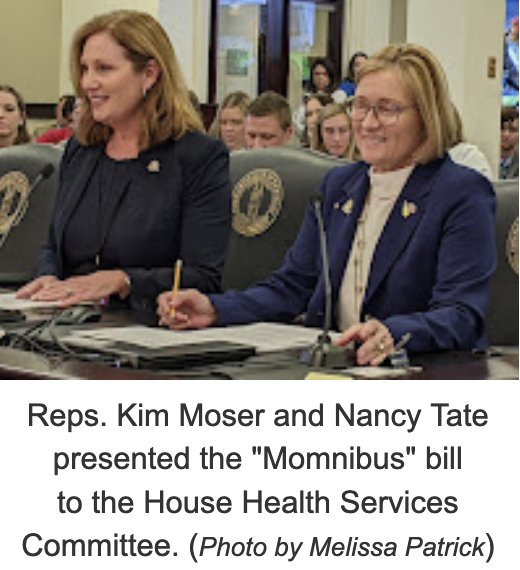‘Momnibus’ bill aimed at lowering state’s maternal-mortality rate, second highest in the nation, moves to the full House for a vote

By Melissa Patrick
Kentucky Health News
A bill aimed at decreasing the state’s high maternal-mortality rate was approved by the House Health Services Committee Thursday and now awaits a vote in the full House. It’s been dubbed the “Momnibus” bill.
The prime sponsor, Rep. Kim Moser, R-Taylor Mill, who chairs the committee, said House Bill 10 was the result of an informal House-Senate workgroup that dug into Kentucky’s maternal-mortality data over the summer to try to understand why the state has the nation’s second highest rate of death in the year following a childbirth in the nation, according to the Centers for Disease Control and Prevention.
“It was a bipartisan, bicameral look at what’s wrong with our maternal health in Kentucky, why are our numbers so high and what can we do about it,” she later told reporters. “So this really addresses the priorities that we thought we could tackle.”
She told the committee that the bill addresses a number of contributors to the state’s high maternal-death rate.
“Initiatives that are included in this legislation will address the high rate of substance-use disorders, which are now the number one reason that Kentucky women die in the first year following childbirth; a lack of access to prenatal care, a lack of access to mental health treatment, a lack of education and this also provides a referral to service including treatment support and follow up care,” she said.
Kentucky’s maternal-mortality rate is 38.4 maternal deaths per 100,000 live births, according to CDC data gathered by the Kaiser Family Foundation. This number includes the deaths of women while pregnant or within 42 days of termination of pregnancy in 2018-21. During that time, Kentucky had 81 maternal deaths.
Rep. Nancy Tate, R-Brandenburg, a co-sponsor of the bill, said 89% of the deaths could be preventable and that 54% of the deaths are related to substance-use disorder.
Moser agreed, telling reporters, ” “I mean, if we’re talking about the maternal-mortality numbers that rival a third-world country, we have got to get serious about this.”
What would the bill do?
A key part of the bill would allow a special health-insurance enrollment period for pregnancy by allowing it to be designated as a “qualifying life event.” Said another way, this would allow a woman without health insurance to sign up for coverage at any time after becoming pregnant.
“We discovered that pregnancy was not considered a qualifying life event for some insurance, and we just want to close that gap and make sure that moms can get the prenatal care that they need,” said Moser. “That’s the period of time when we know that any chronic disease or any health issue is picked up and can more easily be dealt with.”
It also would establish the Kentucky maternal psychiatric access program, called the “Kentucky Lifeline for Moms.”
This program would establish a dedicated hotline to allow health-care providers to connect with a psychiatrist or a psychologist as a way to help address maternal mental health issues. It would be operated by the Cabinet for Health and Family Services and open weekdays from 8 a.m. to 5 p.m.
Moser said the state has a $750,000 grant to implement this program, but it is important to codify it to make sure it is long-lasting.
“We know that mental health is an issue that is not being adequately addressed,” she told reporters.
The bill also calls on the cabinet to establish the Kentucky maternal and infant health collaborative. A committee substitute added two additional members to the collaborative, one from the cabinet’s Department for Public Health and one from a local health department.
Moser said this collaborative will oversee the psychiatric lifeline, will collect data, monitor the program and inform future policy needs. CHFS will also study doula certification, and whether or not this is a valuable service, said Moser.
It also amends and expands the Health Access Nurturing Development Services (HANDS) program, a voluntary home-visitation program for new or expectant parents, to require it to provide lactation counseling, education about the importance of breastfeeding and to provide information about safe sleep for babies. It would also ensure that HANDS clients can participate via telehealth if needed.
“Telehealth has become a really common-sense way to help address some of the health situations that we’re seeing,” Moser told reporters. ” If there are some needs that a mom has, we were looking for any way to help her.”
The amended version of the bill also included remote patient monitoring as a billable service for prenatal care and added in-home addiction treatment as a billable service. It also changed the phrase “pregnant individual” to “pregnant woman.”
Rep. Rachel Roarx, D-Louisville, asked Moser whether a person who identifies with a “gender marker of a different sex” would be excluded from this bill. Moser said the bill would “cover anyone who is carrying that pregnancy. . . . At this point in time, women are the only persons who can conceive and carry a pregnancy to term.”
The bill passed out of the Feb. 8 committee meeting on a vote of 15-0-2, with Reps. Josh Bray, R-Mount Vernon, and Felicia Rabourn, R-Pendleton, passing. Bray said he had questions about the “defrayal” cost to the state Department of Insurance and about a possible floor amendment.
Earlier, Moser mentioned the possibility of a floor amendment to “really target who is able to provide this open enrollment.” She also noted that she had not seen this bill marked as a “cost defrayal” to the state and that it “doesn’t substantially raise the rates.” The department’s financial-impact statement estimates that the bill would increase premiums as much as $1.42 per member per month, or might not increase them at all.